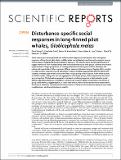Disturbance-specific social responses in long-finned pilot whales, Globicephala melas
Abstract
Social interactions among animals can influence their response to disturbance. We investigated responses of long-finned pilot whales to killer whale sound playbacks and two anthropogenic sources of disturbance: Tagging effort and naval sonar exposure. The acoustic scene and diving behaviour of tagged individuals were recorded along with the social behaviour of their groups. All three disturbance types resulted in larger group sizes, increasing social cohesion during disturbance. However, the nature and magnitude of other responses differed between disturbance types. Tagging effort resulted in a clear increase in synchrony and a tendency to reduce surface logging and to become silent (21% of cases), whereas pilot whales increased surface resting during sonar exposure. Killer whale sounds elicited increased calling rates and the aggregation of multiple groups, which approached the sound source together. This behaviour appears to represent a mobbing response, a likely adaptive social defence against predators or competitors. All observed response-Tactics would reduce risk of loss of group coordination, suggesting that, in social pilot whales, this could drive behavioural responses to disturbance. However, the behavioural means used to achieve social coordination depends upon other considerations, which are disturbance-specific.
Citation
Visser , F , Curé , C , Kvadsheim , P H , Lam , F-P A , Tyack , P L & Miller , P J O 2016 , ' Disturbance-specific social responses in long-finned pilot whales, Globicephala melas ' , Scientific Reports , vol. 6 , 28641 . https://doi.org/10.1038/srep28641
Publication
Scientific Reports
Status
Peer reviewed
ISSN
2045-2322Type
Journal article
Description
The study was funded by the US Office of Naval Research, The Netherlands Ministry of Defence, Norwegian Ministry of Defence and French Ministry of Defence. F.V., C.C., P.K., F.P.L. and P.M. were supported by one or two of these funders. P.T. received funding from the MASTS pooling initiative (The Marine Alliance for Science and Technology for Scotland). MASTS is funded by the Scottish Funding Council (grant reference HR09011) and contributing institutions.Collections
Items in the St Andrews Research Repository are protected by copyright, with all rights reserved, unless otherwise indicated.

